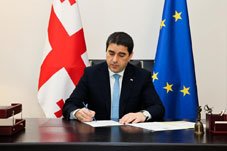
Parliament Chairman Papuashvili Signs Anti-LGBT Bill
By Liza Mchedlidze
Friday, October 4, 2024
On October 3, Georgian Parliament Chairman Shalva Papuashvili signed into law a controversial bill aimed at restricting LGBT rights after President Salome Zourabichvili refused to endorse it but chose not to veto the legislation. Papuashvili, a co-author of the bill, had five days to act after the president's refusal, and the law will take effect 60 days after its publication, falling after Georgia's crucial October 26 parliamentary elections.
In a statement on Facebook, Papuashvili defended the bill, asserting that while Georgians value tolerance, "tolerance means co-existence based on mutual respect, not living to spite others and disturbing public peace by ignoring others' beliefs and values." He claimed that "millions of people" had supported the bill in what he called a "de facto referendum" on May 17, 2024, a claim disputed by rights groups.
The new "Law on the Protection of Family Values and Minors," passed by the ruling Georgian Dream party on September 17, imposes several restrictive measures targeting the LGBT community. These include censorship of media and educational content on queer issues, a ban on gender reassignment procedures, and prohibitions on same-sex marriage and adoption by non-heterosexual or non-cisgender individuals. Same-sex marriage has never been legal in Georgia, but the law equates same-sex relationships with "incest."
The law has drawn significant backlash from human rights organizations, who see it as part of a broader, hate-filled campaign led by the Georgian Dream party ahead of the elections. Critics also argue that the bill stifles freedom of expression and assembly.
President Zourabichvili's decision not to veto the bill has sparked mixed reactions from activists. Some expressed disappointment, while others viewed it as a strategic move to prevent the ruling party from using homophobia as a political tool in the final days before the election.
Papuashvili, anticipating international criticism, remained defiant, stating that Georgians have historically been guided by "faith, common sense, and loyalty to the country," and were unafraid of external judgments.

